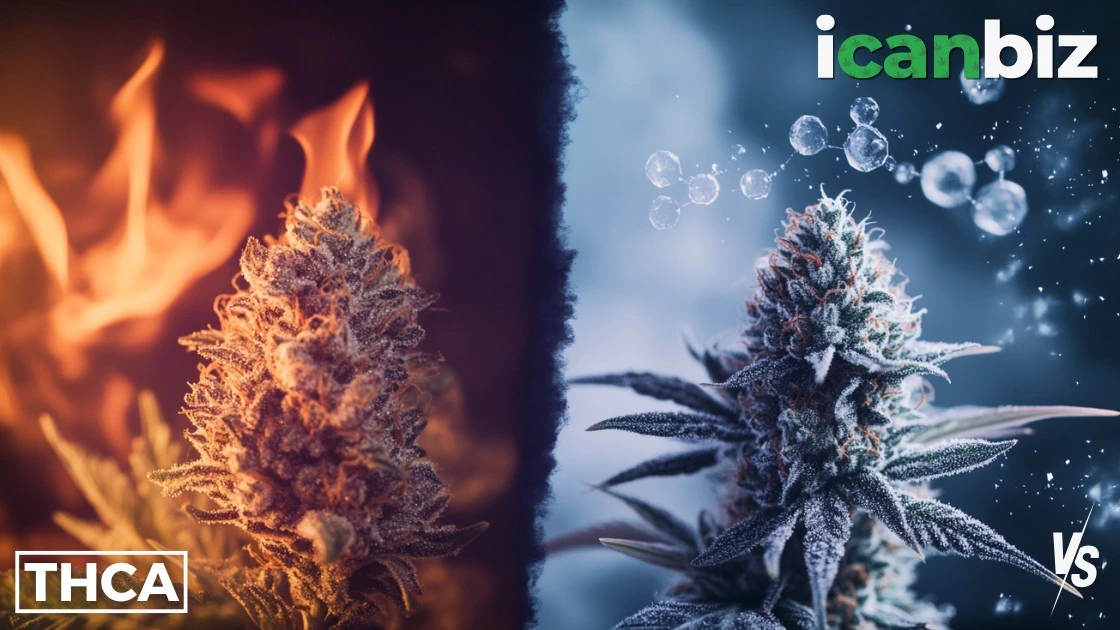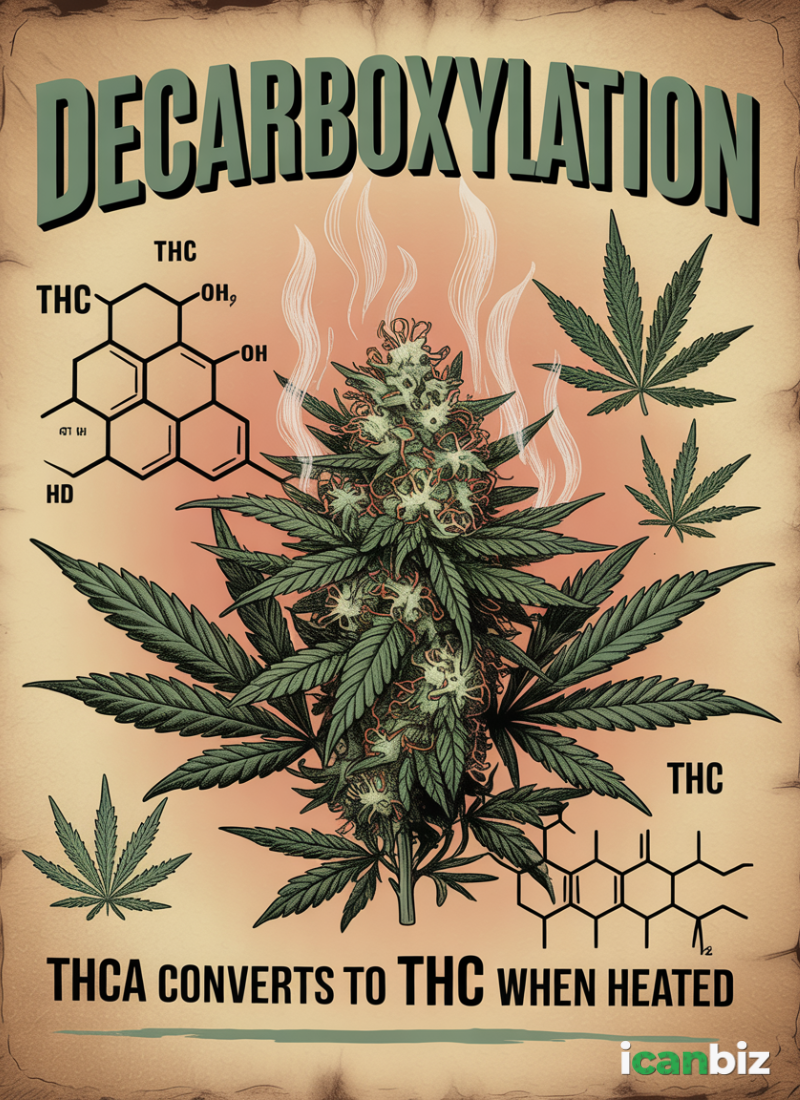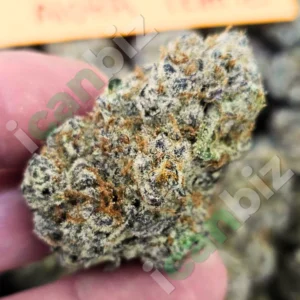THCa Flower vs THC Flower: Why It Matters for Cannabis Retailers

If you’ve been trying to figure out THCA vs THC, you’re not alone. THC is what produces the “high,” while THCA is its raw, non-psychoactive form—often praised for its potential anti-inflammatory and neuroprotective properties. In fact, many users are now seeking out THCA benefits specifically for wellness without the buzz.
As cannabis research continues to evolve, it’s clear that cannabinoids play a central role in how different strains and products affect the body—and understanding them is key to making informed choices.
Chemical Composition of THCa and THC
THCA, short for tetrahydrocannabinolic acid, is a non-psychoactive compound found in unheated cannabis—you’ll see it most in raw cannabis products like freshly harvested flower or cold-pressed juice.
On the flip side, THC (tetrahydrocannabinol) is the compound most people associate with the cannabis “high.” It’s created when THC acid—another way of referring to THCA—is heated, a process known as decarboxylation. This simple reaction turns non-psychoactive THCA into active THC.
The reason these two cannabinoids act so differently lies in their chemical makeup. THCA has an extra carboxyl group, which keeps it from binding to the body’s cannabinoid receptors the way THC does. That small structural difference leads to completely different effects, which is why THCA flower and THC flower aren’t interchangeable.
THC vs THCa’s Psychoactive Effects
The biggest difference between THCA flower and THC flower comes down to psychoactivity. Unlike THC, which binds directly to cannabinoid receptors in the brain and causes that familiar high—euphoria, altered perception, relaxation—THCA doesn’t have the same effect.
That’s because THCA is a non-psychoactive cannabinoid. Its chemical structure includes an extra carboxyl group, which prevents it from activating those receptors. As a result, consuming raw cannabis or THCA flower won’t get you high, making it a great option for those looking for potential health benefits without the buzz.
Understanding how these compounds differ in their effects is essential if you want to make informed choices about your cannabis experience.
Primary Psychoactive Compound

THC is the compound behind the “high” most people associate with cannabis. It’s the primary psychoactive compound in THC flower and the key difference when comparing it to THCA flower, which is a non-psychoactive cannabinoid found in raw cannabis buds.
When you consume cannabis products that have been heated—whether through smoking, vaping, or cooking—THC binds to cannabinoid receptors in the brain. This interaction affects mood, perception, and cognitive function.
But it’s not all mellow vibes. Consuming THC frequently or in high doses can lead to unwanted effects like cognitive impairment, mental health issues, or even dependency over time.
Knowing how THC works helps you make smarter choices based on what you want (or don’t want) from your cannabis experience.
Key Differences Between THC and THCa Flower
When it comes to THCA vs THC, the differences are more than just scientific—they directly impact how cannabis products affect you.
THCA is found in fresh cannabis plants and is non-psychoactive, meaning it won’t get you high. It’s often chosen for its potential therapeutic benefits without the intoxicating effects. On the other hand, THC is psychoactive and responsible for the high that many associate with cannabis use.
The transformation happens when THCA converts to THC through heat—a process called decarboxylation. That’s why people who consume THCA by juicing raw flower or using unheated products don’t experience the same mind-altering effects as those smoking or vaping THC flower.
Understanding these key differences helps consumers choose products that align with their goals, whether that’s relief without impairment or a recreational experience.
Hemp-Derived THC and THCa: The Current Legal Guidelines
The legal landscape for cannabis can be confusing—especially when it comes to THCA and THC. While they come from the same plant, their psychoactive properties make a big difference in how they’re regulated.
THCA is non-psychoactive and found in raw cannabis, which means it’s legal in many places—often because it doesn’t cause a high. That’s why you’ll see affordable THCA flower sold more freely, especially in states where hemp-derived products are allowed.
THC, on the other hand, is a controlled substance in many areas. The THC legal status varies widely depending on whether a state has legalized cannabis for medical or recreational use. In some places, possession of THC flower is still strictly prohibited, while in others, it’s available through licensed dispensaries.
As cannabis laws continue to evolve, it’s essential for consumers to stay informed. Whether you’re exploring THCA for wellness or THC for recreation, understanding the legal status where you live is key.
Cognitive Impairment
One significant difference between THCA and THC lies in how they affect the brain. THC interacts with the brain’s cannabinoid receptors, which can lead to changes in memory, focus, and decision-making—especially in adolescents and young adults whose brains are still developing.
With frequent or long-term use, THC can contribute to lasting cognitive impairment and may increase the risk of mental health issues like anxiety or depression. These effects are particularly concerning for younger users and those who consume high-potency products regularly.
In contrast, THCA flower is non-psychoactive and doesn’t affect the brain the same way. Because it doesn’t bind to those receptors, it doesn’t carry the same cognitive risks, making it a safer option for those who want potential therapeutic benefits without the high.
Health Benefits of Hemp-Derived Cannabis
High-Quality THCA flower is gaining attention for its potential medical cannabis applications. Early studies suggest it may help reduce inflammation, protect brain cells, and ease nausea—all without causing a high. For those looking to manage withdrawal symptoms or avoid intoxication, it could be a useful option.
THC flower, on the other hand, is often used to stimulate appetite, relieve chronic physical ailments, and ease symptoms associated with conditions like cancer, PTSD, and multiple sclerosis. Different cannabis strains may be tailored for specific medical needs, depending on their THC and THCA levels.
While both compounds offer unique health benefits, their effects and applications are quite distinct—especially when it comes to psychoactivity and safety.
Health Risks of THC Consumption
Despite its therapeutic uses, THC flower does come with risks. Long-term or frequent use can lead to withdrawal symptoms, mental health challenges, and dependency. It’s especially concerning for young users, who may be more vulnerable to these effects.
There are also physical risks—THC use has been linked to cognitive decline and increased anxiety in some users. THCA flower, being non-psychoactive, appears to carry fewer of these risks, though we still need more research to fully understand its long-term effects.
Potential Physical Benefits of Cannabis Flower
Beyond mental effects, cannabis can also impact physical health. Smoking THC flower, in particular, may contribute to respiratory issues like chronic bronchitis and increase the risk of cardiovascular problems over time.
THCA flower, often consumed raw or in non-combustible forms, doesn’t pose the same risks to the lungs or heart. For health-conscious consumers or those with existing conditions, THCA may be a gentler alternative.
No matter your reason for using cannabis, considering your physical health—and how different cannabinoids affect it—should always be part of the conversation.
Wholesale THCa Products Available Online Today (Legally)
-
Aloha Trufflez THCa Flower Wholesale
$1,650.00 -
Blue Runtz THCa Flower Wholesale
$1,350.00 -
Gorilla Truffles THCa Flower Wholesale
$1,350.00 -
Sour Pistachio THCa Flower Wholesale
$1,350.00 -
Italian Ice THCa Flower Wholesale
$1,350.00
From THCA flower to THC-rich edibles, today’s cannabis consumers have more choices than ever. Products come in many forms—dried flower, concentrates, tinctures, edibles, topicals—and the best option depends on your personal needs, goals, and tolerance.
Whether you’re seeking relief from physical aches and soreness or simply exploring recreational use, understanding the difference between THCA and THC helps you choose the right product. THCA offers benefits without intoxication, while THC delivers more noticeable psychoactive effects.
Thanks to evolving research and greater product diversity, cannabis products now offer something for nearly every type of consumer—whether you’re new to the space or already well-versed.
Conclusion: THCA vs. THC—Choosing What’s Right for You
Understanding the differences between THCA and THC isn’t just about science—it’s about finding what works best for your lifestyle, health goals, and comfort level. Whether you’re drawn to THCA flower for its non-psychoactive, therapeutic potential or prefer THC flower for its stronger, fast-acting effects, knowing what each compound does empowers you to make informed choices.
From chemical composition and psychoactivity to legal status and health implications, the contrast between THCA and THC can significantly shape your cannabis experience. THCA may be the better option for those seeking wellness without the high, while THC remains a go-to for managing physical discomfort, appetite, or simply unwinding.

Legal Disclaimer:
By reading this information presented, you agree to release the author of any liability that comes from using this data. This post contains no legal advice. Claims about cannabinoids have not yet been approved by the FDA.
References
- https://www.nasdaq.com/articles/cannabis-market-forecast-top-trends-cannabis-2025
- https://www.expressnews.com/business/article/thc-cannabis-texas-ban-dan-patrick-sid-miller-19962200.php
- https://nypost.com/2024/09/01/us-news/bargain-buzz-ny-pot-farm-moves-100000-economical-dime-bags-under-legalization
- https://thecannabisindustry.org
- https://www.cannabisbusinesstimes.com
frequently asked questions
What is the main difference between THCA and THC?
THCA is the raw, non-psychoactive form of THC. Once heated, THCA converts to THC, which binds to brain receptors and produces the “high” associated with cannabis.
Will consuming THCA flower get me high?
Yes and no, raw THCA flower won’t get you high unless it’s heated. Raw THCA doesn’t activate the brain’s cannabinoid receptors due to its extra carboxyl group. But when smoked or cooked, it will react virtually identically to traditional THC.
Is THCA legal in the U.S.?
In many states, yes. THCA is often legal when derived from hemp and not decarboxylated. Laws vary, so always check local regulations before purchasing.
Does THCA have medical benefits?
Preliminary research suggests THCA may help with inflammation, neuroprotection, and nausea—without causing intoxication. However, these claims haven’t been evaluated by the FDA yet.
Is THC more risky than THCA?
THC poses risks like cognitive impairment and dependency with frequent use, especially in younger people. THCA does not share these risks due to its non-psychoactive profile.





